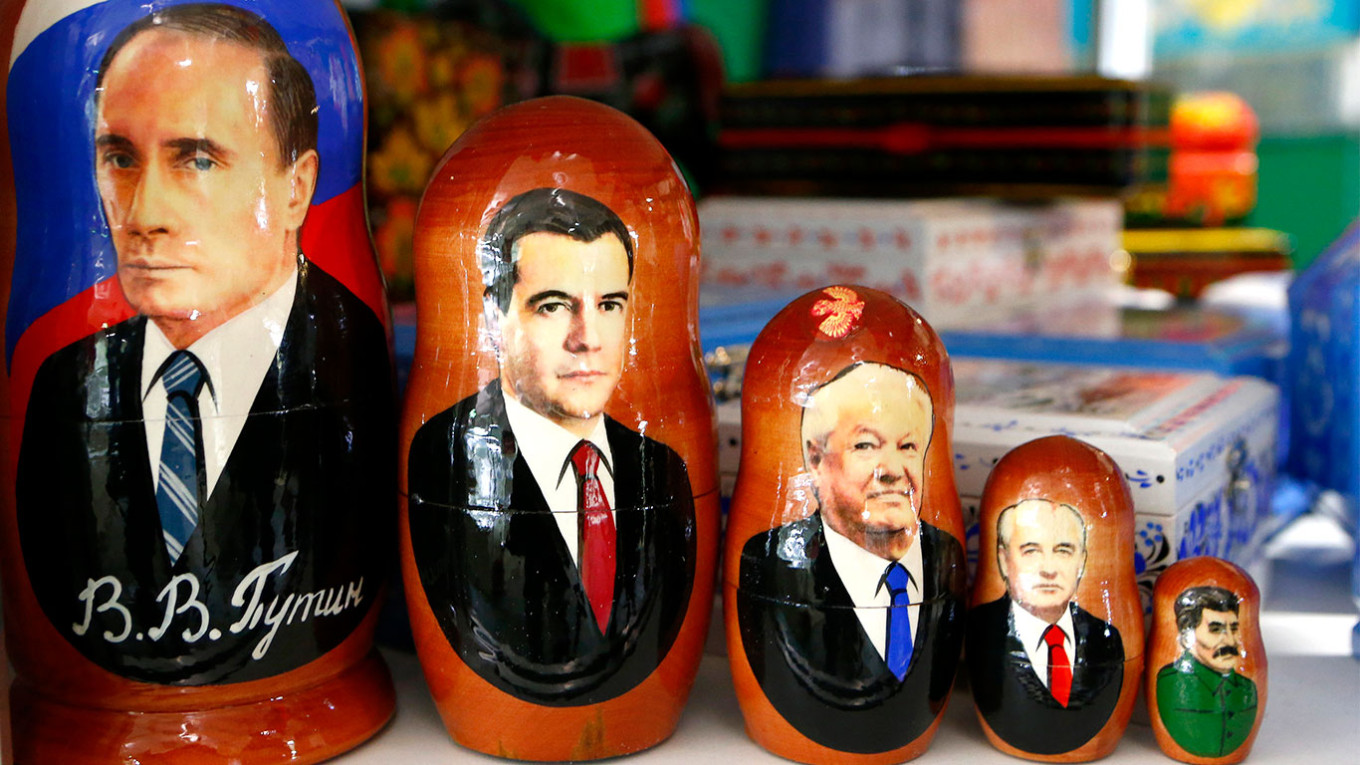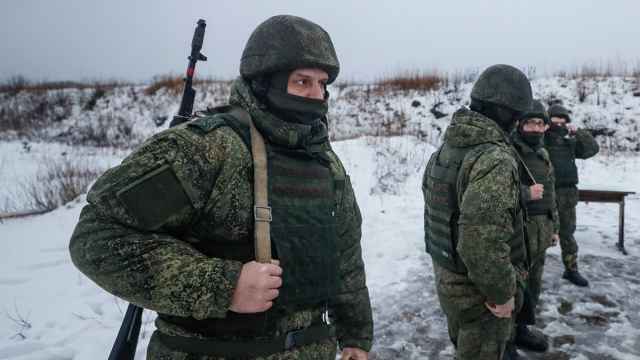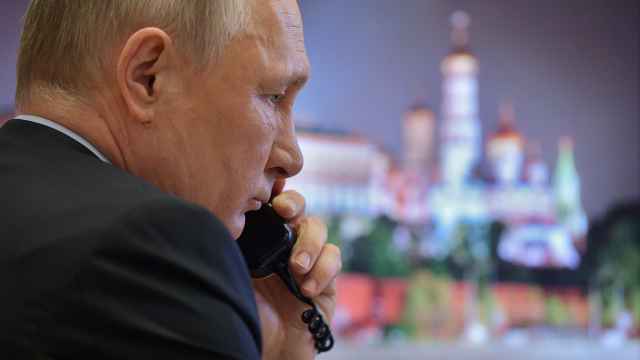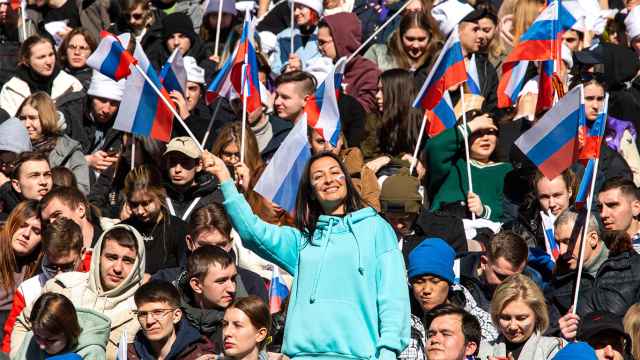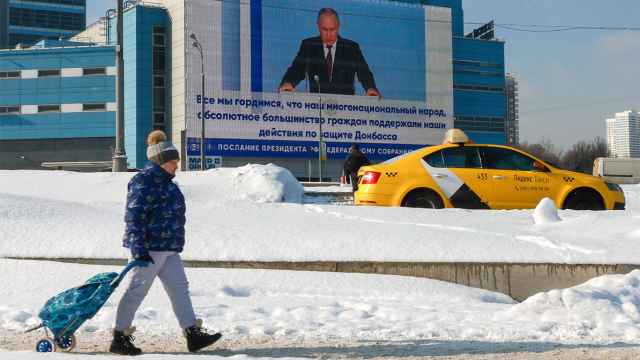In early March, a video made the rounds in which an elderly Russian woman says of Ukrainians: “You need to kill them all, and their children too. They’re a rot that has spread and they don’t like us. They’re neither brothers nor sisters to us.”
Her words, which clearly echo Russian television propaganda, expressed a horrifying desire for violence. Such views are by no means isolated — indeed, many Russian supporters of the war favor radical solutions to solve the “Ukrainian question.”
How can the brutalization of an entire strand of Russian society be explained? How can the violence, cruelty, and aggression that are usually suppressed in human nature have surfaced so brazenly?
Such people are willing to give up comfort, and even their once-precious stability, for the sake of victory over a propaganda-fabricated enemy embodied by Ukraine and the West.
To understand the reasons behind this shift, we must first turn not to the populace itself, but rather to those who rose to power during the post-Soviet transition as their social background, behavior, and character are significant.
Analyzing the Nazis’ rise to power, historical sociologist Norbert Elias wrote that the forces that came to power in Germany were able to “brutalize” society. These forces rejected democracy, were consumed with hatred for Weimar politicians, and were driven by a thirst for national revenge.
Although direct parallels rarely work in history, it can be said that, as a result of the crisis of the 1990s, groups with an authoritarian and militarist ethos also came to power in Russia. These groups were able to crush the weak roots of an emerging Russian democracy and actively resisted the country's pursuit of peaceful development.
The collapse of the Soviet Union broke the old social structure and triggered new processes of social mobility. In the struggle to control previously state-run industries and new capitalist property, so-called “violent entrepreneurs” began to rise to the top — groups such as street gangs, war veterans and organized crime groups that successfully used violence for profit and advancement.
These groupings fought among themselves for power and property at every level of society, with the battle for resources being joined by law enforcement officers, Interior Ministry employees, and the FSB, which occasionally worked in tandem with criminal groups.
The behavioral patterns that formed in this environment were based on the primacy of force. By the early 2000s, once the main battles over assets had died down, it seemed that the country was gradually ready to embark on a path of peaceful development. With the strengthening of the state, economic recovery, and the country’s entry into the system of global ties and institutions, violence should have faded into the shadows.
But that did not happen. After being installed in the Kremlin by Yeltsin’s entourage at the end of the 1990s, Putin and his associates — who had gone through the battles of the previous decade — perceived the power now placed in their hands as a personal instrument of control and wealth accumulation. Now they were the kingpins.
This group neither understood nor needed democracy, which they saw as a chaotic and difficult-to-manage process. Moreover, before their rise to power, Vladimir Putin and his inner circle were second-order figures — not particularly well-educated, with a string of failures in their wake, burdened by insecurities and resentments.
Even though at first many of them did not subscribe to nationalist ideology, and might even have considered themselves to be Western-oriented, they gradually drifted toward nationalism. As was the case with Hitler and his associates, nationalist ideology gave both the authorities and the masses a sense of power and superiority.
Revenge against the democrats who “ruined the country” and then against the West, from which Putin and his entourage felt peripheral, was long overdue, taking shape after the 2011 Bolotnaya Square protests and the annexation of Crimea three years later.
The annexation of Crimea was a “victory” enthusiastically received by the population that doubled as one over those who envisaged Russia’s peaceful development. Those who rejoiced that “Crimea is ours” did not realize at the time that a major war lay ahead of them.
The further accumulation of military power and the rise of a militaristic ethos only strengthened the Kremlin's ambitions. As Sergei Karaganov, one of Putin’s main ideologues, said shortly before the invasion of Ukraine began: “The process of restoring Russian statehood, Russian influence, Russian power, which had been going on for quite a long time, had simply come to the surface … Now as our strength, especially military strength, has accumulated and the geopolitical situation has changed, we felt the right to demand things, not to ask for them.”
Confident that they now had the requisite military strength, Russia’s top brass was finally ready to take its revenge on a West they saw as weak and incapable of fighting back with any resolve.
The war in Ukraine is the climax of a process that introduced violence to Russian society and marginalized forces backing the country's peaceful development. Contrary to the expectations of the early 2000s, the Russian authorities did not monopolize violence but widely diffused it, whether through the use of nationalist and paramilitary groups, extrajudicial reprisals against journalists and political opponents, or the glorification of the army in kindergartens and schools.
Returning to the brutal impulses and fantasies we now find among parts of Russian society, the fusion of Putin’s regime and citizens around violence has been a long time in the making. We can only hope that new forces committed to peaceful development will come to power in postwar Russia and that the civilizing process will finally be given a chance.
This is an edited version of an article that first appeared in Novaya Gazeta Europe.
A Message from The Moscow Times:
Dear readers,
We are facing unprecedented challenges. Russia's Prosecutor General's Office has designated The Moscow Times as an "undesirable" organization, criminalizing our work and putting our staff at risk of prosecution. This follows our earlier unjust labeling as a "foreign agent."
These actions are direct attempts to silence independent journalism in Russia. The authorities claim our work "discredits the decisions of the Russian leadership." We see things differently: we strive to provide accurate, unbiased reporting on Russia.
We, the journalists of The Moscow Times, refuse to be silenced. But to continue our work, we need your help.
Your support, no matter how small, makes a world of difference. If you can, please support us monthly starting from just $2. It's quick to set up, and every contribution makes a significant impact.
By supporting The Moscow Times, you're defending open, independent journalism in the face of repression. Thank you for standing with us.
Remind me later.



